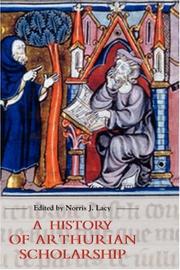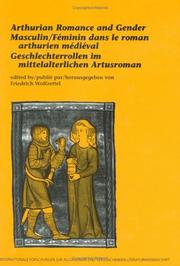| Listing 1 - 7 of 7 |
Sort by
|
Book
ISBN: 9781783162413 9781783162420 Year: 2015 Volume: 8 Publisher: Cardiff University of Wales Press
Abstract | Keywords | Export | Availability | Bookmark
 Loading...
Loading...Choose an application
- Reference Manager
- EndNote
- RefWorks (Direct export to RefWorks)
Artusepik. --- Galicisch. --- Katalanisch. --- Portugiesisch. --- Spanisch. --- Portugiesisches Sprachgebiet. --- Spanisches Sprachgebiet. --- Fiction --- Thematology --- Spanish literature --- Portuguese literature --- King Arthur [Fictitious character]
Book
ISBN: 9781786833433 Year: 2021 Publisher: Cardiff : University of Wales Press,
Abstract | Keywords | Export | Availability | Bookmark
 Loading...
Loading...Choose an application
- Reference Manager
- EndNote
- RefWorks (Direct export to RefWorks)
This is the first comprehensive authoritative survey of Arthurian literature and traditions in the Celtic languages of Welsh, Cornish, Breton, Irish and Scottish Gaelic. With contributions by leading and emerging specialists in the field, the volume traces the development of the legends that grew up around Arthur and have been constantly reworked and adapted from the Middle Ages to the twentieth century. It shows how the figure of Arthur evolved from the leader of a warband in early medieval north Britain to a king whose court becomes the starting-point for knightly adventures, and how characters and tales are reimagined, reshaped and reinterpreted according to local circumstances, traditions and preoccupations at different periods. From the celebrated early Welsh poetry and prose tales to less familiar modern Breton and Cornish fiction, from medieval Irish adaptations of the legend to the Gaelic ballads of Scotland, Arthur in the Celtic Languages provides an indispensable, up-to-date guide of a vast and complex body of Arthurian material, and to recent research and criticism.
Arthurian romances --- Arthurian romances. --- Artusepik. --- Celtic literature --- Celtic literature. --- Keltisch. --- Keltische Sprachen. --- Literatur. --- Literature. --- History and criticism. --- Arthur, --- Artus, --- In literature.
Book
ISBN: 9780226540269 Year: 2018 Publisher: Chicago : The University of Chicago Press,
Abstract | Keywords | Export | Availability | Bookmark
 Loading...
Loading...Choose an application
- Reference Manager
- EndNote
- RefWorks (Direct export to RefWorks)
Romance has traditionally been dismissed by critics for failing to represent the world as it is, and yet it has been embraced by readers attracted to its distinctive depiction of reality. Given the pleasure it has afforded readers over the centuries, is it possible that it is expressing a truth unrecognized by realist genres? The Arthurian literature of the Middle Ages, Karen Sullivan argues, consistently ventriloquizes the criticisms that were being made of romance at the time and implicitly defends itself against those criticisms. The danger of romance shows that the conviction that ordinary reality is the only reality is itself an assumption, and one that can blind those who hold it to the extraordinary phenomena that exist around them, demonstrating that which is rare, ephemeral, and inexplicable is no less real than that which is commonplace, long-lasting, and easily accounted for. If romance continues to appeal to audiences today, whether in its Arthurian prototype or in its more recent incarnations, it is because it confirms the perception - or even the hope - of a beauty and truth in the world that realist genres deny.
17.86 literary genres, theory of genre. --- Arthurian romances --- Arthurian romances. --- Artusepik. --- French literature --- French literature. --- Literature. --- Appreciation. --- History and criticism. --- History and criticism --- Arthur, --- Lancelot, --- Merlin, --- In literature. --- To 1500.

ISBN: 1843840693 9781843840695 9781846154775 Year: 2006 Publisher: Woodbridge Brewer
Abstract | Keywords | Export | Availability | Bookmark
 Loading...
Loading...Choose an application
- Reference Manager
- EndNote
- RefWorks (Direct export to RefWorks)
Thematology --- Arthur [King] --- anno 500-1499 --- Arthurian romances --- Arthurian romances in art. --- Arthurian romances in motion pictures. --- Cycle d'Arthur --- Cycle d'Arthur dans l'art. --- Cycle d'Arthur au cinéma. --- Arthurian romances. --- Koning Arthur. --- Artusepik. --- Literaturwissenschaft. --- History and criticism. --- Histoire et critique. --- King Arthur [Fictitious character]
Book
ISBN: 9780199215096 019921509X Year: 2007 Publisher: Oxford : Oxford University Press,
Abstract | Keywords | Export | Availability | Bookmark
 Loading...
Loading...Choose an application
- Reference Manager
- EndNote
- RefWorks (Direct export to RefWorks)
The indispensable reference guide chronicles the development of the Arthurian legends throughout history, from their origins in medieval literature to their adaptation in modern literature, arts, film, and popular culture. Essential for Arthurian enthusiasts, medievalists, and for those interested in myth and legend.
Arthurian romances --- Britons --- Legends --- Cycle d'Arthur --- Bretons de Grande-Bretagne --- Légendes --- History and criticism --- Handbooks, manuals, etc. --- Adaptations --- Kings and rules --- Histoire et critique --- Guides, manuels, etc. --- Rois et souverains --- Arthur, --- Handbooks, mauals, etc. --- Arthurian romances. --- Legends. --- Artusepik. --- Literatur. --- Legende. --- Kings and rulers --- Kings and rulers. --- Artus. --- Great Britain. --- Légendes
Book
ISBN: 3839458110 Year: 2021 Publisher: Bielefeld transcript Verlag
Abstract | Keywords | Export | Availability | Bookmark
 Loading...
Loading...Choose an application
- Reference Manager
- EndNote
- RefWorks (Direct export to RefWorks)
Während sich die motivischen Parallelen zwischen Artusepen und Computerrollenspielen förmlich aufdrängen, erwartet man mediale Gemeinsamkeiten eher nicht. Doch im agonalen Handlungsschwerpunkt mittelalterlicher Texte scheint eine ludonarrative Logik auf, die mit der Interaktivität von Rollenspielen korrespondiert. Protagonist*innen werden Avatare, Lesende zu Spielenden. Totgeglaubtes mittelalterliches Erzählen kehrt wieder im neuen Medium. Ob Witcher oder Wigalois - Franziska Ascher webt ein dichtes Netz an Querverbindungen zwischen den historisch disparaten Gegenständen. Game Studies und Germanistische Mediävistik treten dabei in Dialog und profitieren voneinander.
Computerspiel; Artusepik; Mittelalter; Agon; Avatar; Narratologie; Literatur; Medien; Popkultur; Germanistik; Computerspiele; Digitale Medien; Literaturwissenschaft; Computer Game; Arthurian Epics; Middle Age; Narratology; Literature; Media; Popular Culture; German Literature; Computer Games; Digital Media; Literary Studies --- Agon. --- Arthurian Epics. --- Avatar. --- Computer Games. --- Digital Media. --- German Literature. --- Literary Studies. --- Literature. --- Media. --- Middle Age. --- Narratology. --- Popular Culture.

ISBN: 905183635X 9789051836356 Year: 1995 Volume: 10 Publisher: Amsterdam Rodopi
Abstract | Keywords | Export | Availability | Bookmark
 Loading...
Loading...Choose an application
- Reference Manager
- EndNote
- RefWorks (Direct export to RefWorks)
Comparative literature
---
Arthur [King]
---
Arthurian romances
---
Civilization, Medieval, in literature
---
Masculinity in literature
---
Femininity in literature
---
Sex role in literature
---
Sex in literature
---
History and criticism
---
Congresses.
---
Arthurromans.
---
Sekserol.
---
Geschlechterrolle
| Listing 1 - 7 of 7 |
Sort by
|

 Search
Search Feedback
Feedback About UniCat
About UniCat  Help
Help News
News